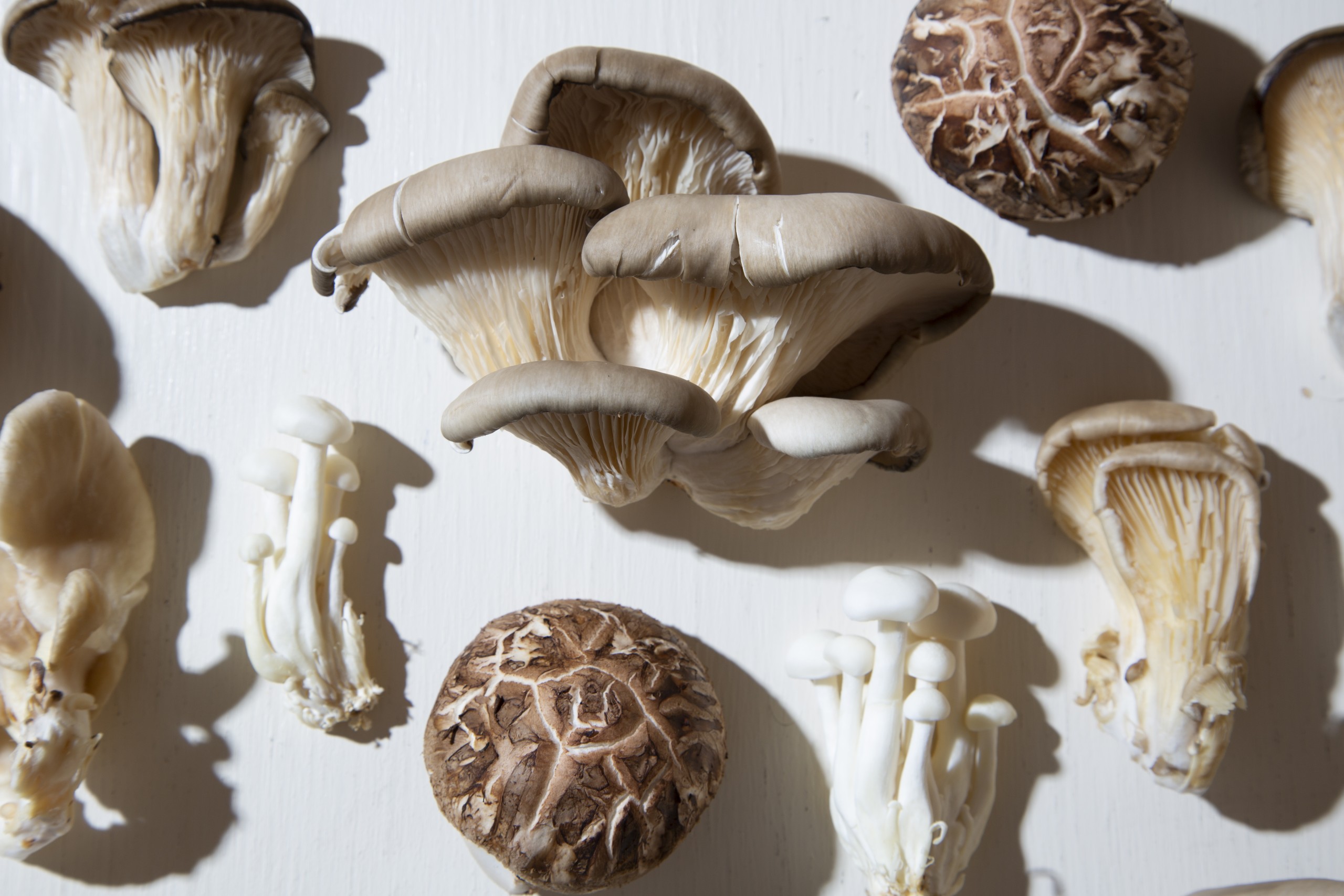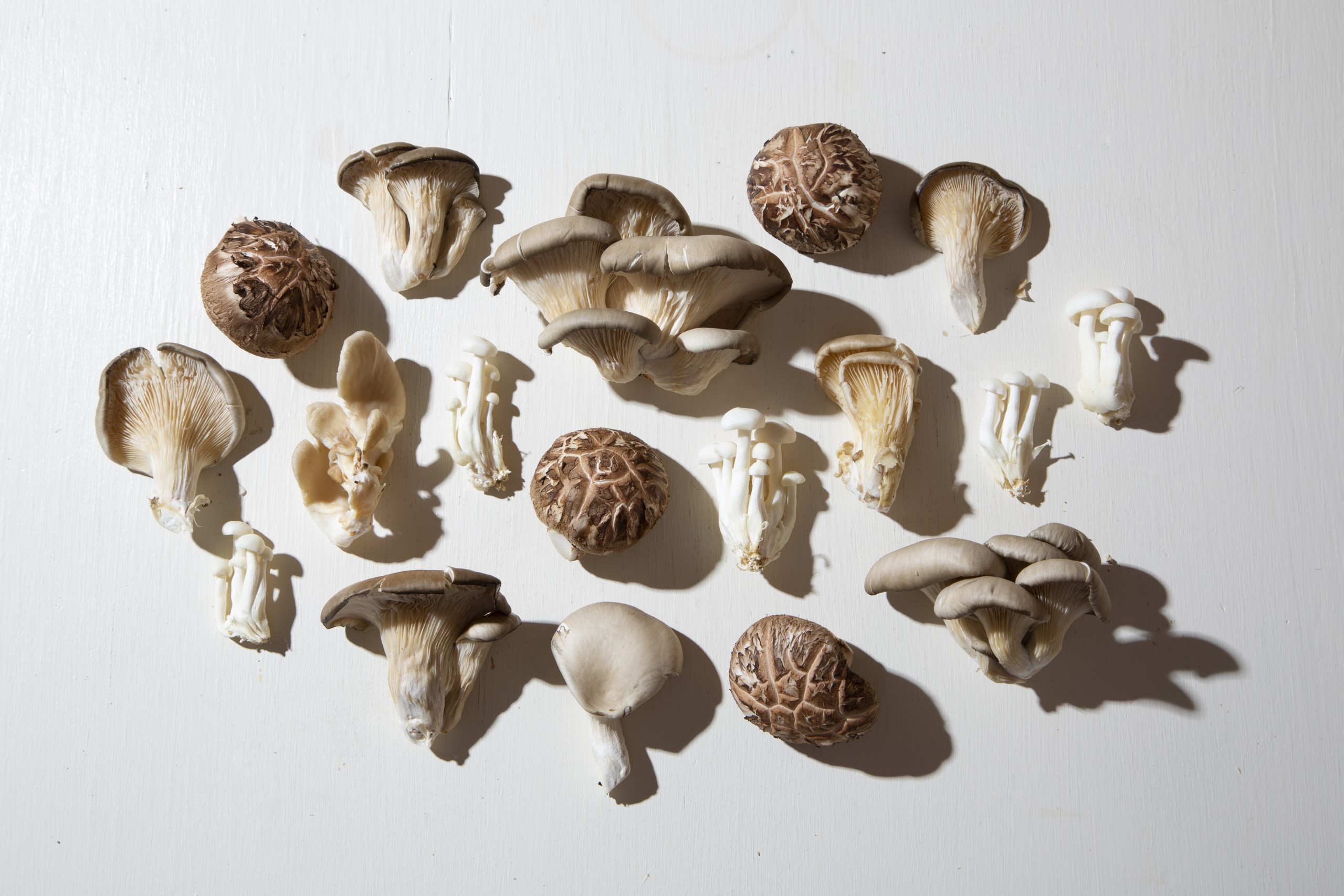Are Mushrooms the Key to Our Future?
5 years ago by
Late last year, The New York Times posed the question, “Are Mushrooms the Future of Wellness?” An astute observation, as mushrooms seemed to be abundantly emerging in unlikely places—filling our Instagram timelines with infused beauty products, alongside claims to be “the next CBD,” and even with an increased interest in foraging, undoubtedly a back-to-nature, pandemic-inspired trend.
So, what’s all the fuss really about? Beyond our colloquial (and narrow-minded) associations of mushrooms as trippy psychedelics favored by hippies, Eastern cultures have long been utilizing fungi’s medicinal properties for healing of all kinds. Immune support and cholesterol management are among mushrooms’ physical health benefits, cognitive function, focus, and energy are among the mental health benefits, and increased collagen and anti-inflammation are noted beauty benefits.
And yet, what if “Are Mushrooms the Future of Wellness?” is the wrong question to be asking? It’s true that their personal benefits are plentiful and remarkable (and we’ll share more about that below). But, it’s the same mycelial elements that make mushrooms so good for us, that also make them so good for the planet. What could be achieved if we expanded our fixation on mushrooms to include a more environmental-focused definition of wellness? They just might be the thing to save us and our planet.
Personal Wellness
Visit any high-end skincare website and you’re likely to find multiple products extolling the virtues of their mushroom ingredients. And while marketing’s employment of buzzwords like “clean” and “green” tends to vaguely oversimplify the mechanics of wellness, when it comes to mushrooms, the research does warrant the aggrandizement.
Ashley Southard is the Co-Founder and CEO of Mushroom Design, a new mushroom-based daily multivitamin. She explains, “Mushroom Design was born out of our desire to create a more traceable and more effective supplement without sacrificing the planet’s health.” Comprised of nine medicinal mushroom varieties and nine essential vitamins (approved by the Current Good Manufacturing Practice, regulated by the Food & Drug Administration), and tested through in-vivo bloodwork trials proving efficacy and non-toxicity, Mushroom Design cuts through the woo-woo of the wellness-industrial complex to provide a product that is truly backed up by science.
On a most basic level, the role fungus plays in our lives and on our planet is to break down organic matter. Sophia Roe, beloved Chef, host of COUNTER SPACE, and noted mushroom devotee, explains, “If not for fungus, the planet would just be covered in dead stuff. Things wouldn’t decompose. Fungus are some of the most important organisms we have on the planet.” When that same technology is then put into personal-care products, like supplements, its job is essentially the same—to target specific microenvironments in need of disintegration, rerouting, or repair. Zach Petrover, Mushroom Design’s Chief Scientist and Formulator, breaks this down for us:
“The immune system plays three main functions: pathogen surveillance, self-surveillance (tissue repair and cancer), and removal of debris. Each of those functions requires a specific microenvironment that has side effects, including chronic/systemic inflammation, which is correlated to many diseases. Multi-Immunity is formulated to avoid massive inflammation and enhance a subset of the self-surveillance response with a focus on tissue repair.”
In layman’s terms, fungi is responsible for keeping our bodies and our ecosystems in a constant state of regeneration.
Beyond Personal Wellness: Planetary Wellness
This is why Sophia, who dedicated an entire episode of COUNTER SPACE to her love of mushrooms, is so drawn to fungi. Actually, it’s not just mushrooms she touts, it’s the entire fungal kingdom (or “queendom,” as her favorite Mycologist, Giuliana Furci, would say)—molds, spores, yeasts, etc. “We really need to go bigger when having this conversation,” she says. “We need to start looking at mushrooms as less about individual care and more about community care.” Though Sophia praises the health benefits of mushrooms, she’s more interested in furthering the cause of environmental health. “I want people to appreciate their profound planetary impact. That’s where we need to put the money and the research.”
Under Sophia’s philosophy, fungi’s radical potential to combat climate change through regenerative agriculture is vastly underrated, underfunded, and overlooked. She believes we’re wasting this invaluable asset on “plump lips,” when fungi could quite literally be the thing to change the world. She cites certain fungi’s ability to eat through plastics, manage waste-water, create composts, and recycle resources.
A quick internet search of “Tremella Mushrooms” (Sophia’s personal favorite) proves her point. All the top hits for this so-called “beauty mushroom” revolve around personal care. Missing entirely from the first page of Google responses is anything to do with the fungi’s environmental uses. Sophia cites the fact that Tremella Mushrooms have the incredible ability of holding 500 times their body weight in water—the most valuable natural resource on the planet. If more research were put into Tremella’s water retention capabilities, she explains, “We could create water-retaining tarps, we could water more plants, we could develop solutions to benefit people in desert climates.”
Holistic Wellness: Lifecycles & Death
So much of the wellness industry is centered around the concept of anti-aging, an apparent ploy to stifle the ever-present reality of the inevitability of death. If we’re not grappling with the very facts of our own aging bodies—our gray hairs, wrinkles, loss of elasticity—how are we ever supposed to grapple with the concept of our eventual deaths?
Sophia believes that fungi can also be essential here. Because fungus feeds off of dead things, “it proves the worthlessness of death to be untrue,” she says. “I want people to look at rot differently, to look at death differently. While it’s sad, it’s also something else…” It’s essential to the cycle of all things, it’s what allows for newness to grow. If fungus is integral to the survival of our planet, it teaches us a lesson in nourishment, in care-taking, in patience, and in our ultimate interconnected reliance on one another. “Slowly and surely, fungus will decompose a tree,” says Sophia. “And when it’s gone, beautiful flowers will grow, green grass, gorgeous life. Fungus reminds me that tomorrow exists, and that’s something we all really need more of right now.”
What Now?
The existence of supplements and health products utilizing mushrooms is amazing, especially when they’re produced under fully sustainable practices and business models, like Mushroom Design (for transparency: their subscription model uses a lifetime-use glass jar, with refills shipped in 100% compostable pouches. All packaging is either biodegradable or compostable, and they print their boxes with carbon-negative algae ink). These incredible natural resources are available to us and they’re trending for a reason, because they work.
And beyond that, we must find ways to harness fungi’s environmental potential outside our personal gain. “There’s this idea that food has ‘gone bad’ if it has mold on it,” says Sophia. “Just because it’s not fit for my consumption, doesn’t mean it’s ‘gone bad.’ Just because a tree has ‘died,’ doesn’t mean it’s not home to millions of organisms,” she explains.
When we look outside the confines of our own needs, we can start acknowledging the needs of others and the needs of our planet. In time, leading to an integrated reimagining of our collective future. Mushrooms are great for our bodies and our earth, and we need to give them the credit they deserve—especially when our planet’s needs come second to our own all too often.




























































